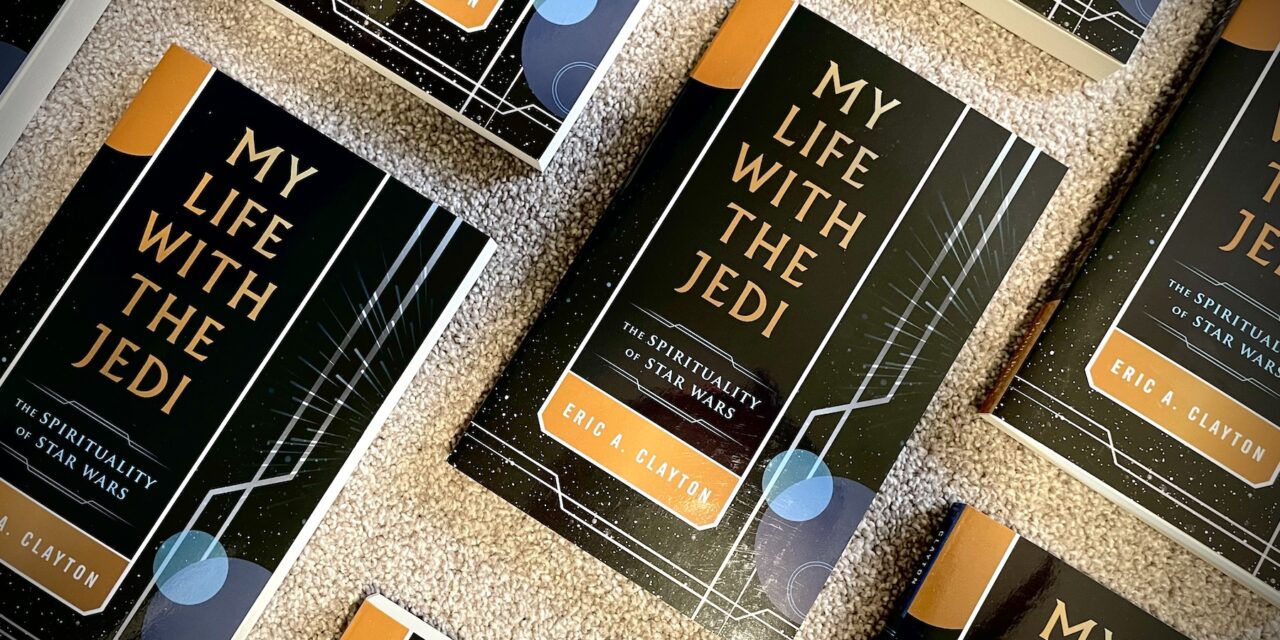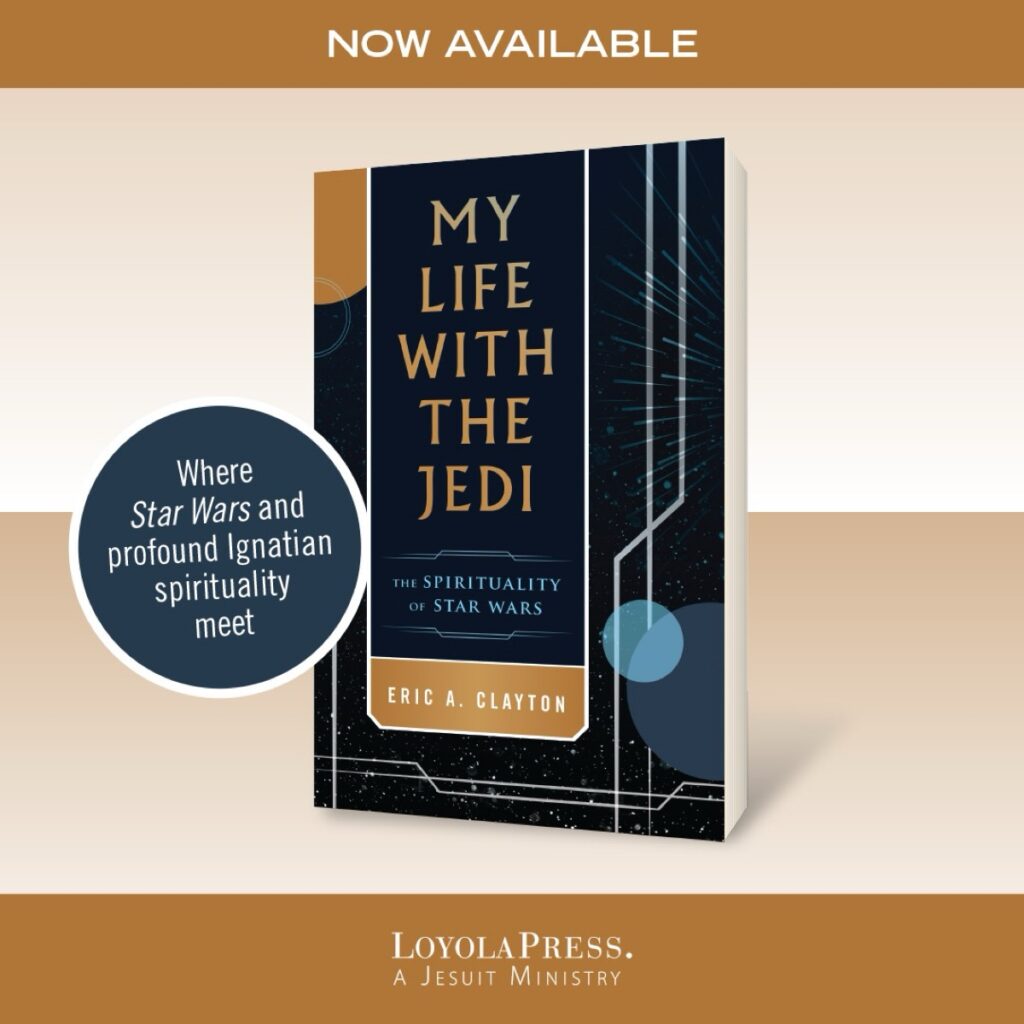This is a guest post by Eric Clayton.
There’s no question that Darth Vader is the villain. At least, not in 1977 when Star Wars first premiered. Back when Vader made his debut by storming onto the beleaguered Tantive IV, his black silhouette cutting against the ship’s otherwise white interior. He almost immediately starts Force-choking people. There’s not a lot of nuance to this character, not a lot of head-scratching audience members thinking, “I wonder if he’s the bad guy?”
But as the years have gone on and the franchise has ballooned to incorporate a variety of galaxy-spanning eras, we’ve begun to see that the dark side of the Force isn’t such a static thing after all. Heroes and villains both move along the spectrum, teetering between the light and the dark based on the choices they make and the trajectories upon which they set their lives.
No longer are these characters simply personifications of “good” or “evil”—if they ever were. Now we see complex characters on true spiritual journeys, wrestling with temptation and decisions and relationships. Those are things we, too, wrestle with in this galaxy oh-so-near. Those are things that impact the trajectory of our very real lives.
George Lucas—it’s well-known—was intentionally vague in the spiritual underpinning of his work; we, the viewers, are invited to bring to Star Wars our own spiritual and religious experiences. As a student of Ignatian spirituality and a lifelong Star Wars fan, it was hard not to see within Lucas’ space opera a call to discern between dueling spirits. We can call those spirits the light side and the dark, or we might call them the standards of Christ and the enemy of our human nature.
That’s one of the main reasons I wrote “My Life with the Jedi: The Spirituality of Star Wars”—I wanted to respond to Lucas’ challenge, his invitation to bring our spiritual selves into dialogue with this beloved story. And by doing so, I wanted others to do the same. Ignatian spirituality certainly has no monopoly on Star Wars; neither does Christianity writ large. We see in that galaxy far, far away insights into and from Buddhism, Hinduism, Stoicism and more, if we but take the time to look.
That’s what makes the story so compelling: We are called into dialogue with the characters and the places and the plot points. We are dared to bring our own spiritual journeys alongside that of Jedi and Sith alike. Because in so doing, we discover something new about who we are and are becoming.
For me, the discernment of spirits plays out in the story of Luke Skywalker. He walks into the cave on Dagobah and thinks he knows what to do. He believes he is powerful enough; he just needs to overcome this supposed enemy. And yet, what happens? He’s challenged to reassess his assumptions. He’s forced to think more deeply about his own life trajectory because if he carries on hacking and slashing first and asking questions later, he, too, will succumb to the dark side. The cave demands he find a different path.
Is that not what St. Ignatius of Loyola experienced, having come face-to-face with his own pride by way of cannonball strike? Is that not the spiritual journey we all walk? There is no singular choice that sets us permanently upon the path to light; we work out our redemption in the day-to-day choices we make. And we hear God’s voice whispering to us in our desires and our passions and our dreams, encouraging us onward.
Star Wars is about redemption. It’s about hope, and it’s about discerning our truest purpose, those calls to adventure that sound off all around us. These are compelling themes for any story because they are the very things that compel us in our own lives.
These Star Wars themes are the raw material of any spiritual path. These are the touchstones to which we return as we make our own choices, as we chart our paths between Anakin Skywalker and Darth Vader. Ignatius tells us that God is to be found in all things—and so, why not turn to that galaxy far, far away to see what the Spirit might desire to teach us in our very real lives?
About the Author

Eric A. Clayton is the award-winning author of two books: “My Life with the Jedi: The Spirituality of Star Wars” and “Cannonball Moments: Telling Your Story, Deepening Your Faith.” He is the deputy director of communications at the Jesuit Conference of Canada and the United States where he writes a weekly column on Ignatian spirituality and everyday life called “Now Discern This” and frequently hosts the weekly “AMDG: A Jesuit Podcast.” His essays on spirituality, parenting and pop culture have appeared at America Magazine, National Catholic Reporter, Busted Halo, Dork Side of the Force and more, and his speculative fiction has been published by Air and Nothingness Press, Black Hare Press, Small Wonders Magazine, among others. He has a BA in creative writing and international studies from Fairfield University, an MA in international media from American University and a graduate certificate in the Ignatian Tradition from Creighton University. He lives outside of Baltimore, MD, with his wife, two daughters and cat. Learn more at ericclaytonwrites.com.





